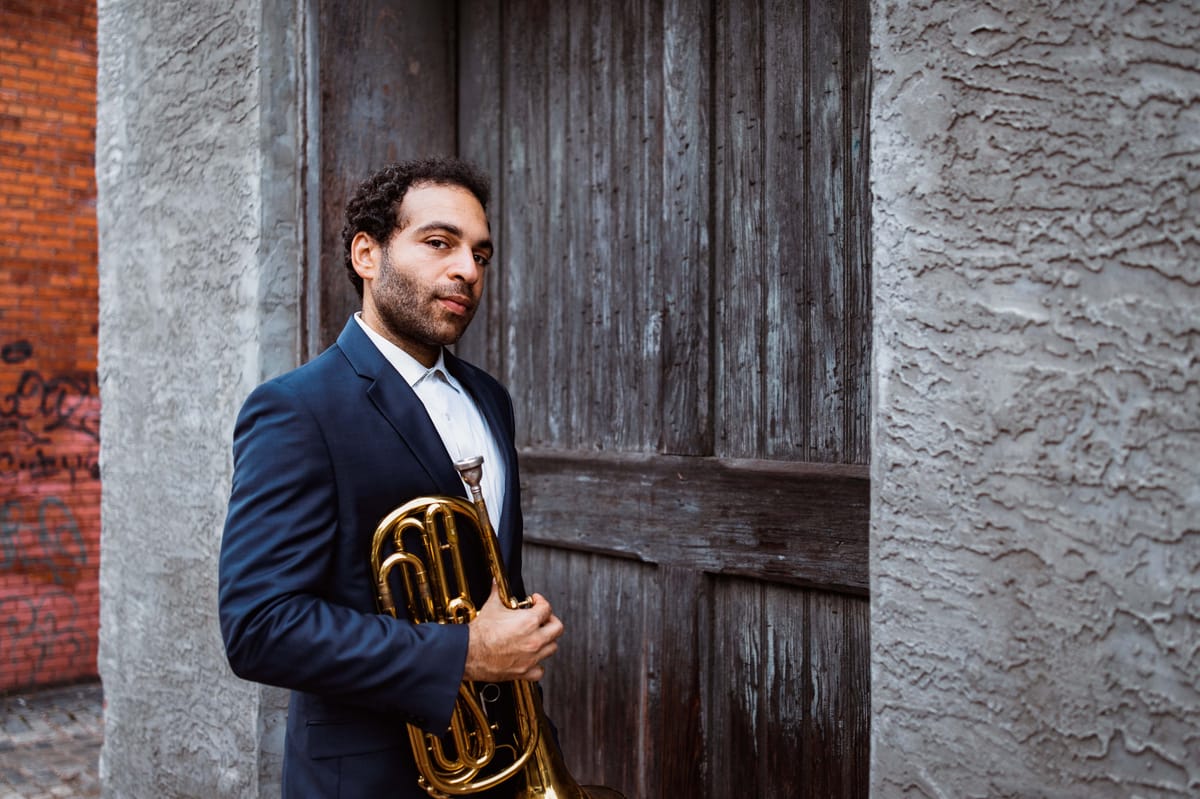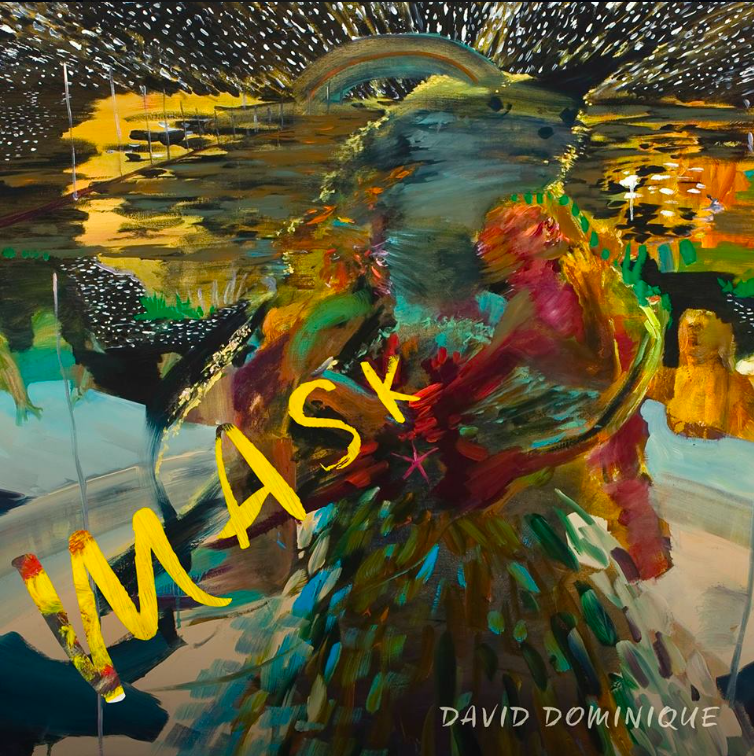‘Mask’: David Dominique’s “Instantly Familiar And Wildly Unpredictable” New Work

PROSPECT HEIGHTS – A musician with deep roots in Brooklyn returns to New York City on Thursday (November 15) to celebrate the release of his latest album Mask. David Dominique was born in Queens and spent time in Long Island growing up, but his father taught at Clara Caldwell Middle School in Bed-Stuy for many years and was later principal of P.S. 241 in Crown Heights.

After earning his degree at NYU, Dominique moved to Brooklyn, living near the corner of Dean and Nostrand before moving to Prospect Heights close to Grand Army Plaza. “When I was in Brooklyn I was more into practicing djembe (West African drumming) and making weird sound experiments and abstract song compositions at home,” he recalled. “And playing in a lot of ska and reggae bands.”
There doesn’t seem to be a straight line between any of that and the music on his new album, but the connection between Mask and anything else might not be a straight line. The tunes sound somehow both instantly familiar and wildly unpredictable. “I can’t not listen,” said a friend hearing the record for the first time. “It’s like I’m watching a tightrope walker, and he could fall at any moment.”
“That’s what I was trying to craft,” Dominique said. The songs are “pretty short, and they don’t have a lot of individual solos. It kind of forces you to listen and it’s almost a little bit aggressive. It’s not background music. I’m trying to create music with no minute of it that becomes ‘Oh, ok.’ There’s really not a lot of repose. It’s all like ‘Listen to me, listen to me, listen to me.’ Maybe that’s a little bit immature and something I should work on, but for now that’s how it turns out.”

It’s remarkable that this kind of music results from Dominique applying the processes of minimalism, a style most associated with very gradual change, or even complete stasis. He remembered “listening to a lot of Philip Glass and Steve Reich and Terry Riley and LaMonte Young that really use a lot of repetition in their music, the classic American minimalists.”
At the time, Dominique was considering a career as a composer and thought about applying minimalist procedures to the kind of atonal music pioneered by composers like Arnold Schoenberg and Anton Webern. “Little did I know at that time there were people doing that!” Dominique said. (He eventually wrote about one of them, Beat Furrer, as part of his PhD dissertation. Dominique has paralleled his career as composer and performer with another as an academic, currently on the faculty of the College of William and Mary.)
He saw an opportunity to apply minimalist techniques to his own music when working on his album Ritual. Recorded in 2013, many of the eight musicians remain in the octet that perform on his latest release, including wind players Brian Walsh and Joe Santa Maria, drummer Andrew Lessman and guitarist Alex Noice. (Dominique performs on flugabone, a flugelhorn/trombone hybrid.)
“I had a tune called ‘Ritual 4 Release.’ I wanted this thrashing atonal rock punk thing, trashy drums and an atonal horn line,” he recalled. “What happened was that horn line didn’t really have a lot of material. I don’t know what made me turn toward minimalist processes to get length.”
“It’s a phrase of uneven length,” said Dominique. “I got interested in what happens if I just take five eighth notes of this and explore—like grab three beats here and just repeat it six times—and then another directly from the riff but keep changing the beginning and ending of the phrase.”
Recording Mask five years later, Dominique brought back many of the same musicians, adding Lauren Baba on viola, Sam Robles on sax, and bassist Michael Alvidrez. Like the mix of performers, the new album reprises some of the same themes as Ritual but encompasses some changes as well.
“On Ritual I was able to achieve a rawness,” Dominique said. “Maybe now I’m too neurotic to let things be that rough. I’d like to get back there, but I do think Mask is a more detailed, thoughtful offering.”
The earlier record had featured the application of minimalism to an atonal composition. “What if I applied it to jazz material?” Dominique asked himself.
“Ritual really has [Charles] Mingus’ influence either naïvely or proudly. I didn’t want to repeat that,” he said. “I didn’t want Mask to be like, ‘Okay, this guy loves Mingus.’ One of the ways that I tried to get out of that was I tried to apply minimalist procedures, to try unpredictable repetition with some of the jazz stuff I was doing.”
“Take some material that feels almost generic and make it really interesting by having this weird type of musical behavior that runs it through a mill,” Dominique explained. “The material is almost stupid, it’s like third grade. But when I start running it through these processes and experimenting with them—What if I changed the phrase length here? What if I moved this bass to a different part of the bass line?—it gets interesting to me really fast.”
The simplicity of the underlying material may be what gives the music on Mask its familiarity, with the minimalist techniques creating the unfamiliarity. The common theoretical approach gives the nine songs on the album great coherence, with each tune making a visceral connection to the listener, but the emotional temper of that connection varies enormously from one piece to another.
Some of the songs on Mask can make you laugh out loud, an unexpected response to instrumental music. Can a sound be funny? Describing the “cartoonish joyride” of a tune called “The Yawpee,” Dominique explained that it opens with “a yowl within a context that is supposed to be bebop or hard bop. It doesn’t make sense, it’s not something you would expect to hear in that kind of music, so I think the humor just comes from its context.”
Something analogous happens on “Invisibles” where a pair of musical figures methodically lengthen and repeat, then shift in tempo and suddenly break into something like Tarzan’s jungle scream. It’s unexpected and exhilarating.
But a similar process on the aptly titled “Grief” has the opposite effect. “The shape of the melody is a repetitive attempt to climb upward that always fails,” Dominique said. “It always slouches back downward. The nature of the melody of “Grief” is one of lamentation and failure. You have a small movement up and a large movement up and they always end up back at their starting point. Over and over again, it feels like you’re just standing downcast puttering around in a small circle. There’s something kind of pathetic about it. You have all these voices and they’re striving upwards and it’s almost like crying. Then there’s one voice that’s screaming. It’s harrowing that it should end in such a downcast and modest, failed way.”
Dominique, who has also composed music for theater and opera as well has played with the “Los Angeles-based musical collective and marching band” Killsonic, will perform music from Mask and other compositions at Nublu Classic on Thursday, November 15 at 9pm.




